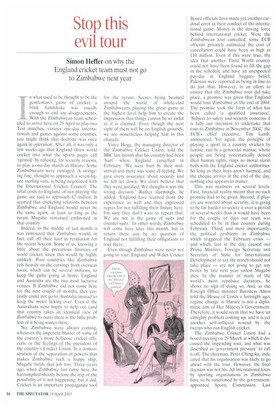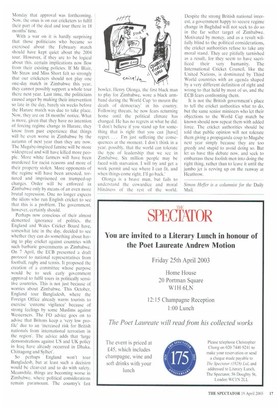Stop this evil tour
Simon Heifer on why the England cricket team must not go to Zimbabwe next year 1 ., n what used to be thought to be the gentleman's game of cricket, a brisk handshake was usually enough to end any disagreements. With the Zimbabwean team scheduled to arrive here on 29 April to play two Test matches, various one-day internationals and games against some counties, you might think that doctrine was once again in operation. After ail, it was only a few weeks ago that England threw world cricket into what the sports pages call 'turmoil' by refusing, for security reasons, to play a one-day match in Harare. Some Zimbabweans were outraged. A swingeing fine, thought to approach a seven-figure sterling sum, is being negotiated with the International Cricket Council. The total costs to England of not playing the game arc said to approach £2 million. It seemed that cricketing relations between Zimbabwe and England would never be the same again, at least so long as the tyrant Mugabe remained enthroned in that country.
Indeed, in the middle of last month it was rumoured that Zimbabwe would, in fact, call off their tour in retaliation for the recent boycott. Some of us, knowing a little about the precarious finances of world cricket, knew this would be highly unlikely. Poor countries like Zimbabwe rely heavily on the earnings from overseas tours, which can be several millions, to keep the game going at home. England and Australia are the two most lucrative venues. If Zimbabwe did not come here for the next couple of months, they certainly could not go to Australia instead to keep the meter ticking over. Even if the Australians were happy to help out (and that country takes an identical view of Zimbabwe to ours) there is the little problem of it being winter there.
No: Zimbabwe were always coming, whatever the impotent bluster of some of the country's more bellicose cricket officials, or the feelings of the president of the country's Cricket Union. In a demonstration of the separation of powers that makes Zimbabwe such a happy ship, Mugabe holds that job too. Three years ago, when Zimbabwe last came here, he harrumphed shortly before the trip of the possibility of it not happening; hut it did. Cricket is an important propaganda tool for the tyrant. Scenes being beamed around the world of white-clad Zimbabweans playing the great game at the highest level help him to create the impression that things cannot be so awful as it is claimed. Even though the next sight of them will be on English grounds, we are nonetheless helping him in this charade.
Vince Hogg, the managing director of the Zimbabwe Cricket Union, told the BBC last month that his country had been 'hurt' when England cancelled in February. 'We were hurt by their nonarrival and there was some ill feeling. We gave every assurance about security and we felt let down. We don't believe that they were justified. We thought it was the wrong decision.' Rather alarmingly, he added, 'England have learned from the experience as well and they expressed regret for not fulfilling their fixture here. I'm sure they don't want to repeat that. We are not in the game of suits and counter-suits.' In other words, Zimbabwe will come here later this month, hut in return there can be no question of England not fulfilling their obligations to tour there.
Even though Zimbabwe were never not going to tour. England and Wales Cricket
Board officials have made yet another cardinal error in their conduct of the international game. Money is the driving force behind international cricket. Were the Zimbabwean tour cancelled. some ECB officials privately estimated the cost of cancellation could have been as high as 110 million. Even if this were true, the idea that another Third World country could not have been found to fill the gap in the schedule and have an unexpected pay-day in England beggars belief; Pakistan were reported as being in line to do just that. However, in an effort to ensure that the Zimbabwe tour did take place, a promise was given that England would tour Zimbabwe at the end of 2004. The promise took the form of what has been called 'a qualified assurance'. 'Subject to safety and security concerns it is fully our intention to undertake that tour to Zimbabwe in November 2004,' the ECB's chief executive, Tim Lamb, announced. Yet again, the principle of playing a sport in a country stricken by famine, run by a genocidal maniac, whose people are being systematically denied their human rights, rings no moral alarm bells with the England cricket authorities. So long as their boys aren't harmed, and the cheque arrives at the end of the day, nothing else appears to matter.
This was madness on several levels. First, financial reality meant that no such promise had to be given. Second, if players are worried about security, it is going to be far harder to secure it over a period of several weeks than it would have been for the couple of days our team was scheduled to be in that country during February. Third, and most importantly, the political problems in Zimbabwe which triggered the February crisis — and which, late in the day, caused our Prime Minister, Foreign Secretary and Secretary of State for International Development to say the match should not take place — are not going to get any better by late next year unless Mugabe dies. In the manner of many of the world's most repulsive dictators, he shows no sign of doing so. And, as the Foreign Office minister Baroness Amos told the House of Lords a fortnight ago, regime change in Harare is not a diplomatic aim of Her Majesty's Government. Therefore, it would seem that we have an almighty problem coming up, and it is yet another self-inflicted wound by the twerps who run English cricket.
The Zimbabwe Cricket Union had a board meeting on 29 March at which it discussed the impending tour, and what was described as 'government pressure' to call it off. The chairman, Peter Chingoka, indicated that his organisation was likely to go ahead with the tour. However, the final decision was not his. All international tours by sporting organisations in Zimbabwe have to be sanctioned by the governmentappointed Sports Commission. Last Monday that approval was forthcoming. Now, the onus is on our cricketers to fulfil their part of the deal and tour there in 18 months' time.
With a war on it is hardly surprising that those politicians who became so exercised about the February match should have kept quiet about the 2004 tour. However, if they are to be logical about this, certain implications now flow from their existing policies. If Mr Blair, Mr Straw and Miss Short felt so strongly that our cricketers should not play one one-day match in Zimbabwe this year, they cannot possibly support a whole tour there next year. Last time, the politicians caused anger by making their intervention so late in the day, barely six weeks before the Harare match was due to take place. Now, they are on 18 months' notice. What is more, given that they have no intention of forcing regime change in Harare, they know from past experience that things will be even worse in Zimbabwe by the autumn of next year than they are now. The Mugabe-inspired famine will be more widespread and will have killed more people. More white farmers will have been murdered for racist reasons and more of their property stolen. More opponents of the regime will have been arrested, tortured and imprisoned on trumped-up charges. Order will be enforced in Zimbabwe only by means of an even more brutal repression. One no longer expects the idiots who run English cricket to see that this is a problem. The government, however, certainly should.
Perhaps now conscious of their almost demented ignorance of politics, the England and Wales Cricket Board have, somewhat late in the day, decided to see whether they can do something about having to play cricket against countries with such barbaric governments as Zimbabwe. On 7 April, the ECB presented a draft protocol to national representatives from football, rugby and tennis. It proposed the creation of a committee whose purpose would be to seek early government approval to fulfil tours in politically sensitive countries. This is not just because of worries about Zimbabwe. This October, England tour Bangladesh, where the Foreign Office already warns tourists to exercise 'extreme vigilance' because of strong feelings by some Muslims against Westerners. The FO advice goes on to advise that Britons keep a 'very low profile' due to an 'increased risk for British nationals from international terrorism in the region'. The advice adds that 'large demonstrations against US and UK policy in Iraq have already occurred in Dhaka, Chittagong and Sylhet'.
So perhaps England won't tour Bangladesh, but at least such a decision would be clear-cut and to do with safety. Meanwhile, things are becoming worse in Zimbabwe, where political considerations remain paramount. The country's fast bowler. Henry Olonga, the first black man to play for Zimbabwe, wore a black armband during the World Cup 'to mourn the death of democracy' in his country. Following threats, he now fears returning home until the political climate has changed. He has no regrets at what he did. 'I don't believe if you stand up for something that is right that you can [have] regret... . I'm just suffering the consequences at the moment. I don't think in a year. possibly, that the world can tolerate the type of leadership that we sec in Zimbabwe. Six million people may be faced with starvation. I will try and get a work permit and see where I can fit, and when things come right, I'll go back: Olonga is a brave man, but fails to understand the cowardice and moral blindness of the rest of the world. Despite the strong British national interest, a government happy to secure regime change in Baghdad will not seek to do so in the far softer target of Zimbabwe. Motivated by money, and as a result wilfully blind to the political considerations, the cricket authorities refuse to take any moral stand. They are pitifully tarnished as a result, for they seem to have sacrificed their very humanity. The International Cricket Council, like the United Nations, is dominated by Third World countries with an agenda shaped by a very different definition of right and wrong to that held by most of us, and the ECB fears confronting them.
It is not the British government's place to tell the cricket authorities what to do, but the same senior ministers who let their objections to the World Cup match be known should now repeat them with added force. The cricket authorities should be told that public opinion will not tolerate them giving a propaganda coup to Mugabe next year simply because they are too greedy and stupid to avoid doing so. But let us have this debate now, and seek to embarrass these foolish men into doing the right thing, rather than to leave it until the jumbo jet is revving up on the runway at Heathrow.
Simon Heifer is a columnist for the Daily Mail.



































































 Previous page
Previous page